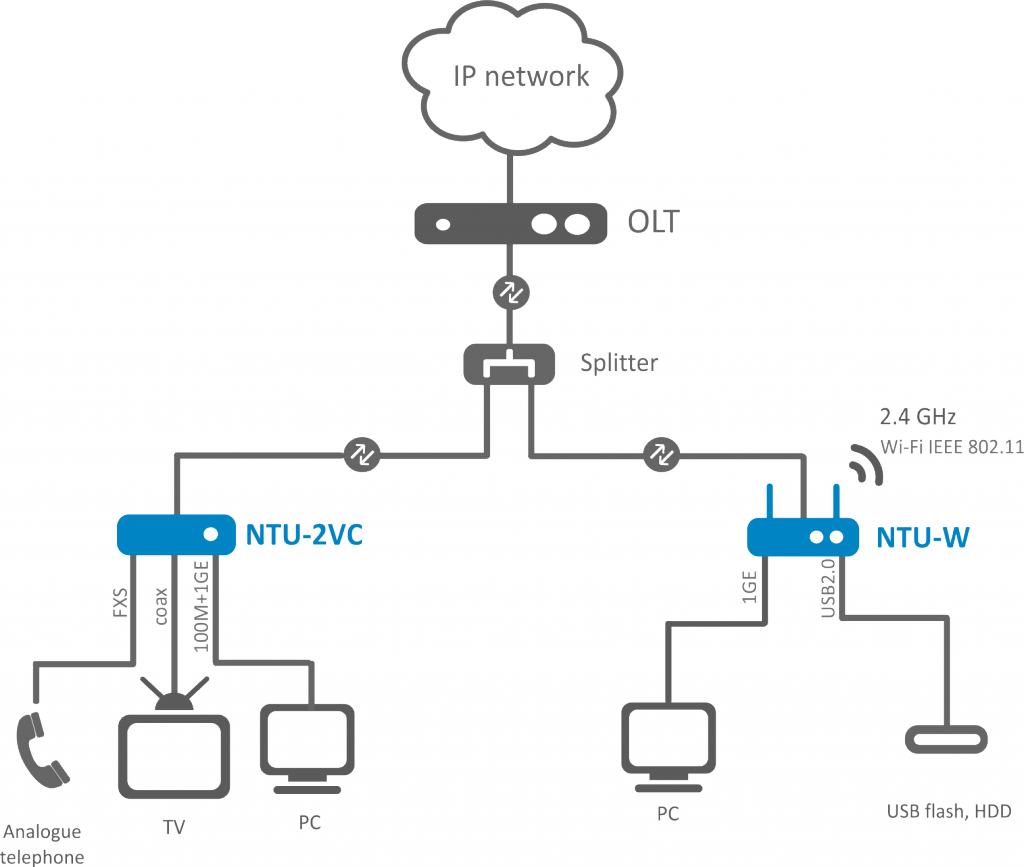Subscribe
You will receive on your e-mail all the news about the product, updating software and documentation!
ONT NTU-2W
Overview
Specifications
Reviews
- 1 GPON port
- Gigabit router
- FXS port for analogue phone connection
- USB 2.0 port for network storage or printer connection
- Wi-Fi 802.11b/g/n
- Wi-Fi 802.11a/n/ac
PON Technology
PON Technology is the most modern and effective “last mile” solution. This solution reduces the amount of cable and provides data transfer with downlink rate up to 2.5 Gbps and uplink rate up to 1.25 Gbps. PON-based solutions in access networks allow end users to have access to a set of services based on IP protocol.
Universal Devices
Integrated 4-port1 10/100/1000 Base-T Gigabit router allows to create a high-performance connection for network devices. FXS port enables VoIP services. The USB port can be used for USB-enabled devices (USB flash drives, external HDD, printer).
Supported services:
- High-speed Internet access
- Video streaming/ High Definition TV/IP TV, Video on Demand (VoD), Video conferencing
- VoIP
- Online educational and entertainment programs
- Providing of broadband access services to subscribers located in apartment houses, residential areas, campuses or suburban settlements
- Corporate network construction at large strategic enterprises, or in office buildings with high requirements in terms of security and data transfer rates
NTU-2W user routers allow you to connect Wi-Fi clients via IEEE 802.11b/g/n standard.
Application diagram

Interface
1 The maximal speed rate is defined due to IEEE 802.11n/ac standard specifications. The real speed rate will be a little different
2 The maximal power amount will be changed due to radio regulation rules of each country
3 For NTU-RG-1431G-Wac
- 1 GPON port
- Complience with ITU-T G.984.2, ITU-T G.984.5 Filter, FSAN Class B+, SFF-8472
- SC/APC connector type
- Transmission medium: fiber optical cable SMF-9/125, G.652
- Maximum reach: 20km
- Transmitter: 1310nm DFB Upstream Burst Mode Transmitter
- Data Rate: 1244Mb/s
- Average Launch Power +0,5..+5 dBm
- Spectral Line Width @ -20 dB 1nm - Data Rate: 1244Mb/s
- Average Launch Power +0,5..+5 dBm
- Spectral Line Width @ -20 dB 1nm
- Data Rate: 2488Mb/s
- Receiver Sensitivity -28 dBm With BER better than or equal to 1.0x10-10 (-30)
- Receiver Optical Overload -4 dBm
- 1 x Ethernet 10/100/1000 Base-T (RJ-45) port
- 1 x Ethernet 10/100 Base-T (RJ-45) port
- SIP support
- Audio codecs: G.729 (A), G.711(A/U), G.723.1
- Fax transmission: G.711, T.38
- Loop resistance: up to 2kΩ
- Dialing mode: pulse/frequency (DTMF)
- Caller ID broadcast
- 802.11 b/g/n standards
- MIMO: 2x2
- Frequency range: 2400 – 2483,5 MHz
- Security of wireless connection: WEP, WPA/WPA2
- 802.11b: 1, 2, 5.5, 11 Mbps
- 802.11g: 6, 9, 12, 18, 24, 36, 48, 54 Mbps
- 802.11n: from 6,5 to 300 Mbps (from MCS0 to MCS15)
- 802.11b (11Mbps): 17 dBm
- 802.11g (54 Mbps): 15 dBm
- 802.11n (MCS7): 15 dBm
- IEEE 802.11b: DQPSK, DBPSK, CCK
- IEEE 802.11g: BPSK, QPSK, 16QAM, 64QAM, OFDM
- IEEE 802.11n: BPSK, QPSK, 16QAM, 64QAM with OFDM
- 1 x USB 2.0 port for USB-enabled devices
- Dimensions: 147x110x24 mm, desktop design (NTU-2W)
- Power consumption 10W max
- Operating temperature range: from +5°С to +40°С
- Relative humidity up to 80%
- ITU-T G.984.x - GPON
- ITU-T G.988 OMCI specification
- IEEE 802.1D
- IEEE 802.1Q
- IEEE 802.1P
- Port transfer rate limiting
- FEC coding
- TR-069 support
- 'Bridge' and 'Router' operation modes, incl. virtual router mode
- PPPoE support (auto, PAP, MSCHAP and CHAP authorization)
- IPoE support (DHCP-client and static)
- DHCP server on LAN side
- Multicast traffic transmission via Wi-Fi
- DNS (Domain Name System)
- DynDNS (Dynamic DNS)
- UPNP (Universal Plug and Play)
- NAT (Network Address Translation)
- NTP (Network Time Protocol)
- QoS
- IGMP Snooping
- IGMP Proxy
- SMB, FTP-alg, Print Server
- VLAN complying with IEEE 802.1Q
- Due to TR-142:
- Remote control via OMCI protocol
- Remote control via TR-069 protocol - WEB/CLI local control
- Software updates: OMCI, TR-069, HTTP, TFTP
1 The maximal speed rate is defined due to IEEE 802.11n/ac standard specifications. The real speed rate will be a little different
2 The maximal power amount will be changed due to radio regulation rules of each country
3 For NTU-RG-1431G-Wac





